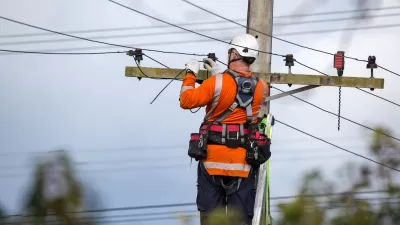How preparation and modern infrastructure can prevent power failures in an era of climate change.

The contrasting experiences of Texas and California during recent extreme weather events highlight the critical importance of resilient energy infrastructure and strategic planning in the face of climate change. For Yale Climate Connections, Dana Nuccitelli examines how Texas’ lack of preparation during Winter Storm Uri in February 2021 led to catastrophic power outages, while California’s proactive measures helped the state avoid major blackouts during record-breaking heat waves.
In Texas, over 4.5 million homes lost power during the storm, resulting in hundreds of deaths and revealing significant vulnerabilities in the state’s energy grid. Despite initial claims by Texas Gov. Greg Abbott that renewable energy was to blame, investigations showed that failures occurred across all types of power generation, including natural gas, coal, and wind. The primary issue was a lack of winterization and preparation for severe cold, not the inherent reliability of any particular energy source.
In contrast, California faced its own challenges during a record heatwave in 2020, which led to brief rolling blackouts. However, in the years following, the state made significant investments in grid management, battery storage, and regional cooperation. These efforts paid off during the extreme heat of 2024, when California's grid not only avoided blackouts but also provided energy to neighboring states.
For urban planners, these examples underscore the importance of investing in resilient infrastructure and adopting a comprehensive approach to energy management. Texas’ decision to maintain an isolated grid system further limited its ability to import power during the crisis, highlighting the risks of grid isolation and the benefits of regional integration.
FULL STORY: How mismanagement, not wind and solar energy, causes blackouts

Alabama: Trump Terminates Settlements for Black Communities Harmed By Raw Sewage
Trump deemed the landmark civil rights agreement “illegal DEI and environmental justice policy.”

Planetizen Federal Action Tracker
A weekly monitor of how Trump’s orders and actions are impacting planners and planning in America.

Why Should We Subsidize Public Transportation?
Many public transit agencies face financial stress due to rising costs, declining fare revenue, and declining subsidies. Transit advocates must provide a strong business case for increasing public transit funding.

Understanding Road Diets
An explainer from Momentum highlights the advantages of reducing vehicle lanes in favor of more bike, transit, and pedestrian infrastructure.

New California Law Regulates Warehouse Pollution
A new law tightens building and emissions regulations for large distribution warehouses to mitigate air pollution and traffic in surrounding communities.

Phoenix Announces Opening Date for Light Rail Extension
The South Central extension will connect South Phoenix to downtown and other major hubs starting on June 7.
Urban Design for Planners 1: Software Tools
This six-course series explores essential urban design concepts using open source software and equips planners with the tools they need to participate fully in the urban design process.
Planning for Universal Design
Learn the tools for implementing Universal Design in planning regulations.
Caltrans
Smith Gee Studio
Institute for Housing and Urban Development Studies (IHS)
City of Grandview
Harvard GSD Executive Education
Toledo-Lucas County Plan Commissions
Salt Lake City
NYU Wagner Graduate School of Public Service




























